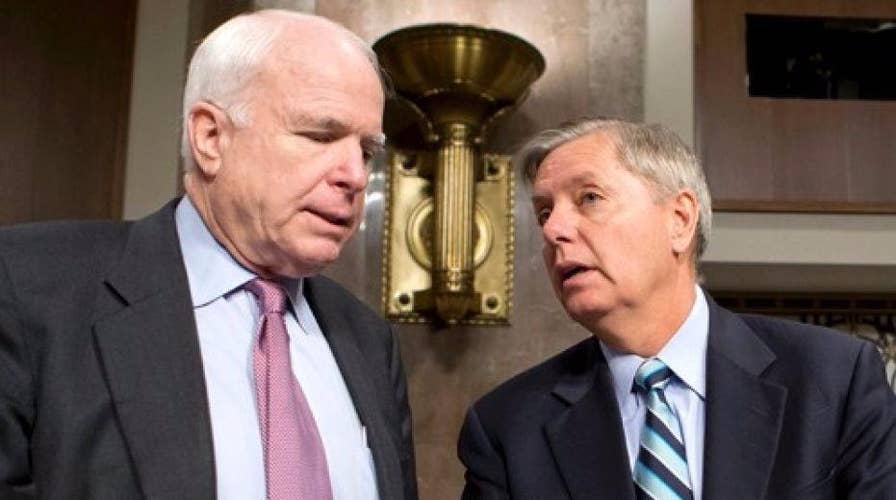Sen. John McCain deals blows to Cassidy-Graham bill
Republican senator says cannot in good conscience support the GOP's latest effort to repeal and replace ObamaCare; chief congressional correspondent Mike Emanuel reports from Washington
John McCain has once again shown he has no loyalty to his party, his friends, or to his voters. In likely torpedoing what may prove Republicans’ last effort to rid the country of ObamaCare, McCain evinced the nostalgia of an old man for better times. He wants the Senate to operate as it once did, with bipartisan comity and regular order. Yes, and I’d like to return to the days when kids were addicted to twilight stickball rather than video games.
Those gentler times are long gone. What we have now is a bitterly divided Congress, and country. Democrat leaders Chuck Schumer and Nancy Pelosi have vowed total resistance to the agenda of President Trump and his GOP allies. In particular, they will never join in dismantling ObamaCare, the lone achievement of Trump’s predecessor, even as it falls apart. As CNN reported, “Due to Senate rules, any attempt to repeal and replace ObamaCare will need 60 votes after the end of this month. That is an impossibility in the current Senate.” The game has changed; McCain needs to adapt, or retire.
McCain of course used the same excuse for blocking the so-called “skinny repeal” of the Affordable Care Act some months ago. That bill was ill-constructed and unpopular, a Hail Mary effort to fulfill seven years of GOP promises. This time is different; Cassidy-Graham is a worthy effort to pare back a bloated and inefficient federal government, sending health care dollars back to the states. Philosophically and practically, the bill crafted by his best friend Lindsey Graham is appealing; McCain’s defection is inexcusable.
McCain has now voted twice to deep-six legislation that would undo the infrastructure that keeps ObamaCare afloat. In so doing he has all but guaranteed the ACA’s survival. It does not seem to bother him that the real-life impact from ObamaCare on his neighbors has been devastating.
It is especially inexcusable in light of the current state of health care insurance in McCain’s back yard. As he himself noted in his statement about his earlier health care vote, “in my home state of Arizona…premiums are skyrocketing and health care providers are fleeing the marketplace.” In that commentary, McCain called for working in committee to hold hearings on legislative solutions, and in particular advocated heeding “the recommendations of (the) nation’s governors…”
As it happens, Arizona’s governor Doug Ducey supports the Graham-Cassidy bill, and for good reason. Last year, as reported in the New York Times, the state suffered “the biggest average rate increase in the country. The news was even worse in Phoenix, the nation’s sixth-largest city, where the price of a midlevel plan …increase(d) by 145 percent on average.” Because the ACA was truly failing in his state, as all but two providers pulled out, John McCain, running for reelection last year, made repealing and replacing the ACA central to his campaign. He ran an ad saying “When you open up your health insurance bill and find your premiums are doubling, remember that McCain strongly opposes Obamacare.”
Apparently not strongly enough, as McCain has now voted twice to deep-six legislation that would undo the infrastructure – the fees and taxes – that keeps ObamaCare afloat. In so doing he has all but guaranteed the ACA’s survival. He explained that he could not vote for Graham-Cassidy without knowing the impact it might have on people; it does not seem to bother him that the real-life impact from ObamaCare on his neighbors has been devastating.
For example, last year the Times cited Leslie Rycroft of Scottsdale, who was paying $1,100 a month for a United Healthcare plan with a $13,000 deductible for her family of four. Ms. Rycroft did not qualify for subsidies. Looking forward to 2017, she found only one insurer, Health Net, offering plans, and theirs started at $2,200 a month. She described that price as “ridiculous” for what she described as “catastrophic” health insurance. Such terms are why almost 19 percent of Arizona residents do not have health insurance.
McCain’s lament reflected in part the absence of a Congressional Budget Office score for Graham-Cassidy. Since the measure would turn funding back to the states, and the resulting programs are as yet undetermined, a CBO score would be almost meaningless. But here’s what we do know: state officials are more responsive to their constituents than D.C. bureaucrats, and local needs would be prioritized to an extent unimaginable under federal control. That’s the essential premise of Graham-Cassidy, and it is correct.
Arizona was not scored a winner in the analysis of which states would benefit from the new bill; indeed it was estimated that the state could lose as much as $11 billion in federal dollars by 2026. However, Arizona’s dollars can be spent with greater impact in a state freed from the cumbersome and costly mandates of ObamaCare. Innovations such as high-risk pools or creating state-operated reinsurance programs could lead to substantial cost savings. Narrowing the excessive mandates imposed by the ACA would also make health care more affordable.
Polling over the past decades has shown a steady slide in the confidence Americans have in our federal government, consistent with the increased growth of D.C. bureaucracy. At the same time, voters have indicated rising trust and approval of their local government, acknowledging the greater responsiveness and accountability of close-to-home officials. There’s a reason for that. The folks that manage state governments are more fiscally responsible than their counterparts in Washington, in part because they cannot print money. Also, they know that people can move; they can vote not only at the ballot box, but with their feet.
One of the major shortcomings of ObamaCare is its one-size-fits-all architecture. Graham-Cassidy would eliminate that flaw; too bad John McCain isn’t serious about fixing it.

